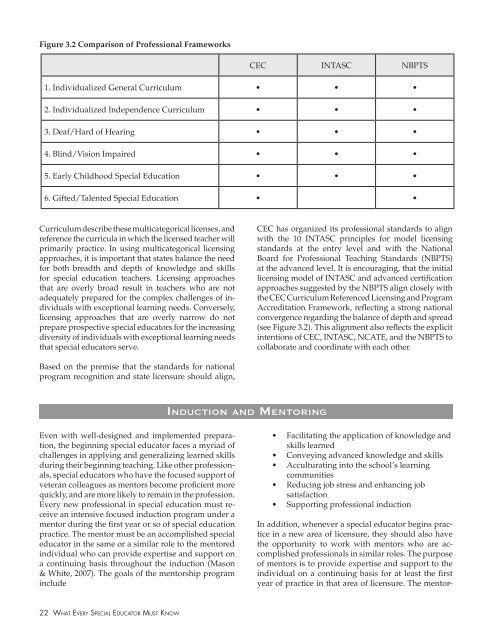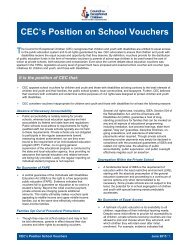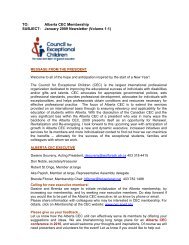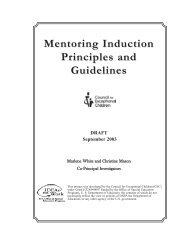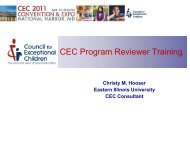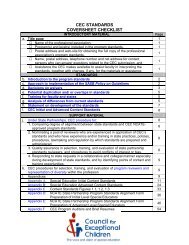What Every Must Know Special Educator - Council for Exceptional ...
What Every Must Know Special Educator - Council for Exceptional ...
What Every Must Know Special Educator - Council for Exceptional ...
You also want an ePaper? Increase the reach of your titles
YUMPU automatically turns print PDFs into web optimized ePapers that Google loves.
Figure 3.2 Comparison of Professional Frameworks<br />
Curriculum describe these multicategorical licenses, and<br />
reference the curricula in which the licensed teacher will<br />
primarily practice. In using multicategorical licensing<br />
approaches, it is important that states balance the need<br />
<strong>for</strong> both breadth and depth of knowledge and skills<br />
<strong>for</strong> special education teachers. Licensing approaches<br />
that are overly broad result in teachers who are not<br />
adequately prepared <strong>for</strong> the complex challenges of individuals<br />
with exceptional learning needs. Conversely,<br />
licensing approaches that are overly narrow do not<br />
prepare prospective special educators <strong>for</strong> the increasing<br />
diversity of individuals with exceptional learning needs<br />
that special educators serve.<br />
Based on the premise that the standards <strong>for</strong> national<br />
program recognition and state licensure should align,<br />
Even with well-designed and implemented preparation,<br />
the beginning special educator faces a myriad of<br />
challenges in applying and generalizing learned skills<br />
during their beginning teaching. Like other professionals,<br />
special educators who have the focused support of<br />
veteran colleagues as mentors become proficient more<br />
quickly, and are more likely to remain in the profession.<br />
<strong>Every</strong> new professional in special education must receive<br />
an intensive focused induction program under a<br />
mentor during the first year or so of special education<br />
practice. The mentor must be an accomplished special<br />
educator in the same or a similar role to the mentored<br />
individual who can provide expertise and support on<br />
a continuing basis throughout the induction (Mason<br />
& White, 2007). The goals of the mentorship program<br />
include<br />
22 <strong>What</strong> EvEry SpEcial <strong>Educator</strong> MuSt KnoW<br />
InductIon and MentorIng<br />
CEC INTASC NBPTS<br />
1. Individualized General Curriculum • • •<br />
2. Individualized Independence Curriculum • • •<br />
3. Deaf/Hard of Hearing • • •<br />
4. Blind/Vision Impaired • • •<br />
5. Early Childhood <strong>Special</strong> Education • • •<br />
6. Gifted/Talented <strong>Special</strong> Education • •<br />
CEC has organized its professional standards to align<br />
with the 10 INTASC principles <strong>for</strong> model licensing<br />
standards at the entry level and with the National<br />
Board <strong>for</strong> Professional Teaching Standards (NBPTS)<br />
at the advanced level. It is encouraging, that the initial<br />
licensing model of INTASC and advanced certification<br />
approaches suggested by the NBPTS align closely with<br />
the CEC Curriculum Referenced Licensing and Program<br />
Accreditation Framework, reflecting a strong national<br />
convergence regarding the balance of depth and spread<br />
(see Figure 3.2). This alignment also reflects the explicit<br />
intentions of CEC, INTASC, NCATE, and the NBPTS to<br />
collaborate and coordinate with each other.<br />
• Facilitating the application of knowledge and<br />
skills learned<br />
• Conveying advanced knowledge and skills<br />
• Acculturating into the school’s learning<br />
communities<br />
• Reducing job stress and enhancing job<br />
satisfaction<br />
• Supporting professional induction<br />
In addition, whenever a special educator begins practice<br />
in a new area of licensure, they should also have<br />
the opportunity to work with mentors who are accomplished<br />
professionals in similar roles. The purpose<br />
of mentors is to provide expertise and support to the<br />
individual on a continuing basis <strong>for</strong> at least the first<br />
year of practice in that area of licensure. The mentor-


